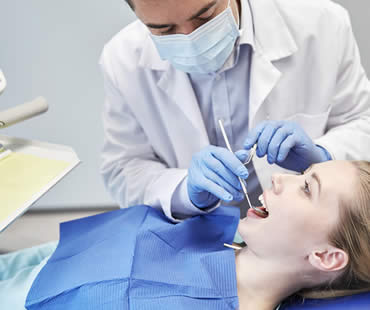
If you didn’t have your wisdom teeth out as a young person, you may be wondering about having them out as an adult. Your dentist may have recommended that you prevent future infections, cysts or pain in the jaw due to wisdom teeth that are growing under other teeth – known as impacted teeth. Even a type of tumor has been linked to impacted wisdom teeth.
Impacted teeth result when the wisdom tooth grows up under an existing tooth. Sometimes, adults have wisdom teeth that come in completely straight behind back molars. In rare cases, one or more of these teeth don’t grow at all. An x-ray can reveal the presence of the teeth. Impacted teeth cause problems with existing teeth and must come out.
Because the roots of wisdom teeth typically fully develop near the age of 24, removing them after this time can be more complicated. Roots can entwine with facial nerves, making extraction problematic. It’s recommended that adults receive a CT scan of their jaw, showing the clear positioning of facial nerves and roots, something not shown by x-rays. If the roots of the lower wisdom teeth aren’t touching or wrapped around the alveolar nerve, extraction is still possible.
Adults with wisdom teeth are at higher risk for gum disease. Gum disease has been linked to an increase of pregnancy complication and other health issues. Previously believed only to affect patients in their late 30s, this gum disease is now being shown to affect much younger patients, especially young pregnant women. Growing evidence is also connecting gum disease to inflammation due to chronic infections in the body, leading to an increased risk of diabetes and heart disease.
Talk to your dentist today to see if you should have your wisdom teeth removed. Be honest about any symptoms you’re having, such as pain or pressure, and let the professional evaluate your specific situation.
Are dental issues holding you back? Take control of your oral health by booking an appointment with our experienced team at our Toronto dental office.

Wisdom teeth are the third set of molars, and usually emerge in the late teens or early twenties. Standard dental practice is to remove wisdom teeth prior to them being fully formed when the roots have not yet had a chance to develop and fully root into the jaw. Younger patients usually have an easier recovery from surgery and many dentists believe early removal prevents future dental problems associated with wisdom teeth.
If your wisdom teeth were not removed as they emerged, there are some signs and symptoms that would indicate the need for extraction including:
- Wisdom teeth that are impacted, which means they have become trapped in the jawbone or gums.
- Wisdom teeth that are emerging at an awkward angle, causing pressure on adjacent teeth.
- Wisdom teeth that do not fit in your mouth, causing crowding of the surrounding teeth as well.
- Wisdom teeth that are suffering from decay or disease caused by the inability to keep them cleaned properly.
- Wisdom teeth that have developed fluid-filled cysts near the gumline.
- Wisdom teeth that are causing pain due to any of the above reasons.
The decision about whether or not to remove your wisdom teeth should be made in consultation with your dental professional. Your dentist or oral surgeon can assess the position and health of your wisdom teeth and make a recommendation for treatment.
If extraction is recommended, they may choose to extract one tooth or all four molars at once. Recovery from the outpatient procedure takes just a few days, and you will quickly be back to normal. Consult with your dental professional if you are experiencing any of these symptoms listed to determine if you should consider wisdom tooth removal to ensure your future good oral health.
Ready to transform your smile? Schedule your appointment today at our Toronto dental office.

Chewing and swallowing can be tricky after wisdom tooth extraction. Gauze pads and a sore mouth can make eating sound unappealing, but it is vital to your healing to maintain a healthy diet. When you have a tooth extracted, a clot forms to help with healing. It’s important not to disrupt the clot, which means it is crucial to maintain a soft-food diet. In addition, spicy, acidic or hard-to-chew foods can cause additional discomfort and prevent healing.
For the first one or two weeks after your wisdom tooth extraction, plan to stick to a diet of soft, easy-to-chew foods. This guideline does not mean you are stuck eating Jello for your entire recovery period. Some suggestions for healthy foods that would be appropriate after wisdom tooth extraction include:
- Mashed potatoes
- Milkshakes
- Cottage cheese
- Macaroni and cheese
Be careful never to use a straw during recovery, as the suction can remove the clots in your gums and create problems with healing. Some of these foods may still be too chewy, so you will need to gauge if they need to be cooked longer or further softened to make them easier to ingest. Pasta or macaroni can be overcooked to make it easier to chew, and soups can be blended to eliminate chunks of vegetables or meat. Be sure to follow the aftercare and eating recommendations of your oral surgeon, and don’t push yourself to return to normal foods until your mouth feels ready.
Do not let another day go by without taking care of your dental needs. Request an appointment now at our Toronto dental office!

Wisdom teeth got their name because they are the final teeth to develop, usually in the late teens to early twenties, at a time when a person becomes fully mature or “wise.” Wisdom teeth are the third and final set of molars in the very back of the mouth. Most people have four total (two upper and two lower), but others never develop them at all. Wisdom teeth can be a valuable chewing aid, but often they are poorly aligned or don’t develop properly.
How do I know if I have them?:
Unless you start to feel them breaking through, you may not know whether you have wisdom teeth or not. Ask your dentist to examine you to see if these teeth are healthy and properly positioned. An x-ray may be required, and your dentist may refer you to an oral surgeon to be evaluated further.
Do wisdom teeth hurt?:
You don’t always feel anything with your wisdom teeth, but sometimes they are very bothersome. You may experience pain when they erupt in awkward positions, especially if the teeth rub against your mouth. Other problems include stiffness in the area, infected swelling of the gums, tooth decay, gum disease, and tooth crowding.
Why remove them?:
Your dentist or oral surgeon might suggest that your wisdom teeth be extracted. They can often predict if your wisdom teeth may crowd or damage other teeth, your jawbone, or nerves. Sometimes removal is appropriate before problems arise, in an effort to avoid more complicated or painful extractions later. Removal is usually simpler and less risky in young people. If your wisdom teeth are not extracted, it’s important for your dentist to continue monitoring them because problems may develop later.
What does impacted mean?:
Wisdom teeth may be impacted, which means they are enclosed in the soft tissue or jawbone or they only partially erupt through the gum. Impacted wisdom teeth are almost always removed to avoid risks of infection, tooth decay, and gum disease.
Take the first step towards optimal oral hygiene. Reserve your dental appointment at our Toronto dental office now and experience personalized care.

Some people would rather endure tooth pain than have their wisdom teeth extracted during surgery. Most of the time, fears are based on irrational tales that people read on the internet or hear from others. The truth is that wisdom tooth surgery is extremely common and most oral surgeons perform them every day without complications. The best way to overcome fear is to learn more about the procedure and recovery.
Procedure:
Extracting wisdom teeth involves opening the gums above the tooth and removing any bone that is blocking the tooth’s ability to erupt. The tissue will be separated to be able to remove the tooth, sometimes even in pieces if necessary. In some cases when bone is removed, a bone graft is needed to replace it. After the procedure is complete, stitches will be placed that will dissolve with time. If this sounds awful, remember that patients don’t feel any pain during the procedure due to sedation and usually don’t even recall anything that happened during treatment.
Recovery:
There are some common outcomes to be expected after wisdom tooth extraction, all of which usually subside within a few days as long as you follow your surgeon’s instructions. Have someone accompany you to and from the appointment so they hear the recovery directions and so you don’t drive. Afterwards, you will be given gauze to bite on at the extraction site. Bite gently on the gauze and change it frequently. Avoid lying flat on your back because bleeding may increase. If you experience swelling, hold ice packs on the outside of your cheeks for the first day. Eat soft foods and avoid using a straw for the first few days, and try not to touch the area with your fingers or tongue. Do not smoke for at least 24 hours after oral surgery. If you follow all these guidelines and any others that your doctor provides, there are few risks and no reason to be afraid of wisdom tooth extraction.
If you live in the Toronto area contact us today

A wisdom tooth is often extracted to correct an existing dental problem or to prevent the possibility of problems that may arise in the future. Some problems associated with wisdom teeth are:
- Your jaw may be too small to accommodate the eruption of your wisdom teeth, leading them to become impacted (stuck in the jaw, often under the edge of an adjacent tooth) and unable to erupt through your gums.
- Your wisdom teeth may partially erupt, leaving a flap of soft gum tissue to grow over the tooth. Food, bacteria and germs can get trapped underneath this gum flap, leading to swelling, redness and pain, which are signs of infection.
- Impacted teeth can lead to a more serious problem, such as acute infection, damage to the surrounding teeth, damage to the bone or the development of a cyst.
- Wisdom teeth can present at an awkward angle, coming in with the top of the tooth facing sideways, forward or backward.
Removing your wisdom teeth can be a good method to prevent:
- crowding at the back of the mouth
- an impacted wisdom tooth stuck in the jaw and never erupting
- painful gums or infection caused by a flap of gum skin
- gum disease or tooth decay in the individual wisdom tooth or in the surrounding teeth and gums
You may want to have your wisdom teeth removed when you are younger because:
- The younger you are, the less developed your wisdom teeth roots are, and the less dense your jawbone, allowing for an easier extraction of the tooth.
- The majority of problems with wisdom teeth begin between the ages of fifteen and twenty-five.
- If you have a medical condition that is known to worsen with time, you may choose to have your wisdom teeth out early, while you are in your best health, to facilitate maximum healing.
Wisdom teeth extraction is rarely harmful, but there are risks associated with any surgery. Talk to your dentist today about any concerns you have regarding wisdom tooth extraction.
If you live in the Toronto area contact us today







 E-Mail Us
E-Mail Us  416-595-5490
416-595-5490








